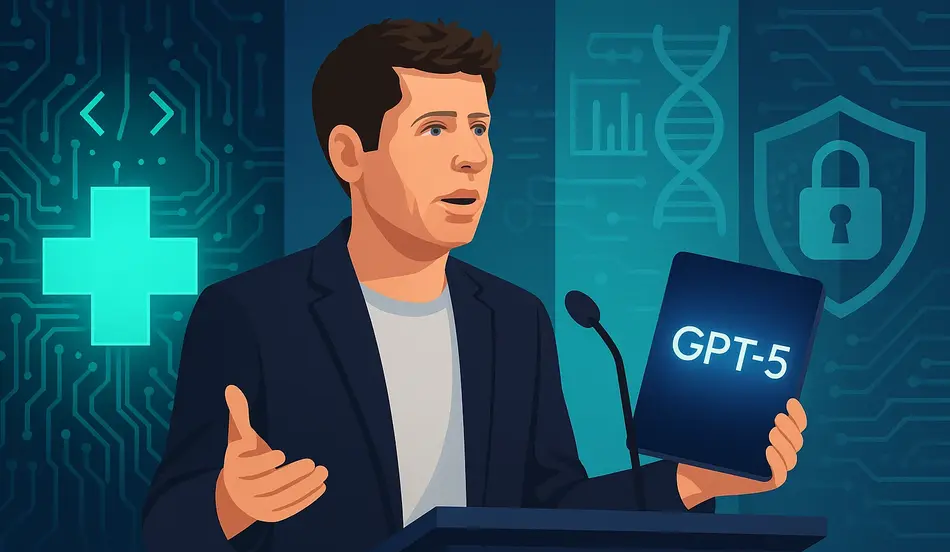OpenAI CEO Sam Altman joined CNBC this week to discuss the latest release of ChatGPT-5, highlighting major upgrades in coding, healthcare applications, and enterprise adoption—while also weighing in on privacy and safety concerns as AI becomes increasingly embedded in daily life.
One Integrated Model
Altman described ChatGPT-5 as “a single, integrated experience” that can answer simple questions quickly while also reasoning through complex, long-form queries.
“There’s just one thing called GPT-5 now, instead of the long list of models we used to have,” Altman explained.
He emphasized the model’s stronger coding capabilities, an area where OpenAI had lagged behind rivals like Anthropic.
“Coding in particular is something that people have been really waiting for a great model for. We put in a lot of effort there,” he said, noting rapid adoption by enterprise clients.
Healthcare Becomes a Top Use Case
Altman revealed that healthcare is now one of ChatGPT’s largest categories of use. Many users—including himself—are uploading medical reports, lab results, and personal health data to get clearer insights.
“Getting people better information on their healthcare and the ability to make better decisions—that seems really important,” he said.
The CEO acknowledged the sensitive nature of this trend, arguing that AI medical data should eventually be given the same protections as legal or doctor-patient privilege.
“Just the fact that you’ve asked ChatGPT to analyze your medical records does not mean they should then be discoverable by a court,” Altman said. “They should be protected by the same standards.”
Privacy and Legal Protections
With users sharing increasingly intimate data, Altman called for new frameworks to govern how AI platforms handle it. He suggested that society will need to extend legal privilege protections to AI consultations in the same way medical or legal advice is safeguarded.
This echoes a broader debate about whether data entered into AI systems should be treated as private, or whether it could be subject to subpoenas or lawsuits.
Hire Experts in Privacy and Compliance
Post your job on WhatJobs and connect with legal, compliance, and data security professionals who can help your organization navigate AI-era privacy challenges.
Post a Job Now →Safety Guardrails in GPT-5
Addressing AI safety, Altman discussed how ChatGPT-5 handles sensitive or dangerous queries.
“If you ask ChatGPT to help you build a bomb, obviously we don’t want to enable you to cause grievous harm,” Altman noted.
The new system is designed to differentiate between safe and unsafe components of a request—offering helpful context where possible, while refusing guidance that could enable significant harm.
Altman admitted this remains an “evolving area” filled with edge cases, but stressed that society will need to define clear boundaries as AI becomes more capable.
Key Takeaways
- ChatGPT-5 unifies OpenAI’s models into one system, with stronger performance on coding tasks.
- Healthcare is now a top use case, with users uploading personal medical data for AI analysis.
- Altman urged legal privilege protections for AI-assisted medical or personal consultations.
- Safety features in GPT-5 are designed to allow learning without enabling harmful applications.
Frequently Asked Questions (FAQ)
1. Is ChatGPT-5 safe for medical advice?
ChatGPT-5 can provide insights and summaries based on medical data, but it should not replace a licensed healthcare provider. Sam Altman noted that healthcare is one of the largest use cases, but users should treat AI as a supplementary tool, not a substitute for professional medical care.
2. What makes ChatGPT-5 different from earlier models?
Unlike previous versions, GPT-5 is a unified system. It can handle both quick, simple queries and more complex reasoning tasks without requiring users to select from different models. It’s also significantly stronger in coding and enterprise applications.
3. How does ChatGPT-5 protect user privacy?
Currently, data entered into ChatGPT can still be legally discoverable. Altman has called for new privacy frameworks—similar to doctor-patient privilege—to ensure that personal or medical information shared with AI remains protected in the future.
4. Can businesses rely on ChatGPT-5 for coding?
Yes, coding has been one of the biggest improvements in GPT-5. OpenAI focused heavily on addressing user feedback around software development. Altman said enterprise adoption is already strong, though he acknowledged that human oversight is still critical to ensure accuracy and security.




